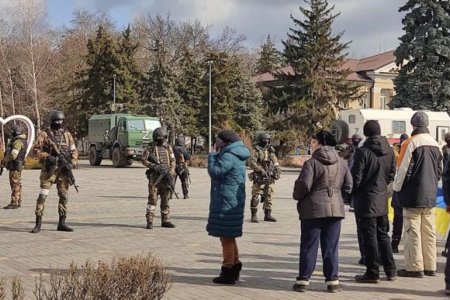
A ‘trial’ that Russia has no right to stage has ended in Rostov with two Ukrainians sentenced to over 20 years’ imprisonment for an alleged attack on Ukrainian territory on another Ukrainian national. On 6 July, the Southern District Military Court sentenced Yuriy Domanchuk to 23 years and Vitaliy Skakun to 24 years for an attack in occupied Skadovsk on Vitaliy Buliuk, a Ukrainian collaborator, installed by the Russians as so-called ‘deputy governor’ of occupied parts of Kherson oblast.
There undoubtedly was an attack on Buliuk, an individual wanted in Ukraine for state treason, on 12 December 2022. His car exploded near where Buliuk lived, with Buliuk only injured, and his driver killed. The latter was identified by the [real] Skadovsk City Council as the husband of another collaborator Liudmyla Kozlova. Buliuk himself was taken to a hospital in occupied Simferopol.
The Skadovsky City Council commented that “the occupiers have forgotten that they are on alien territory. Collaborators believe that, having gained power, they have gained safety. We would remind them that in the Skadovsk area neither collaborators, nor occupiers are welcome. All of them await one end – flight or a black body bag.”
There have been many attacks on Russian-installed collaborators, with all of them resulting in the invading forces carrying out mass raids, ‘searches’, checks of documents, etc. and also blocking transport leaving or entering the city.
Much more is known about Buliuk and his rather unsavoury life as a public official than about the two Ukrainians accused of the 12 December attempt on his life Russian sources report that the ‘court’ heard written ‘testimony’ from Domanchuk’s partner. In this document, which she almost certainly gave under duress, she asserted that Domanchuk and Skakun had planned to carry out the attack, with the plans overseen by Major Pavlo Savytsky from Ukraine’s Security Service [SBU]. Domanchuk had, supposedly, passed Savytsky information about the movements of Russian military in Kherson oblast. The same ‘court’ also appears to have heard the results of ‘interrogations’ of the two men in which the latter supposedly confirmed that Savytsky had coordinated their activities, and organized explosives and weapons.
Virtually all the Russian FSB’s prosecutions of Ukrainian political prisoners have pointed to a person assigned the same, alleged, role as Pavlo Savytsky. It is curious also that the supposed admission by Domanchuk and Skakun that they had carried out the attack under the control of Savytsky was read out from that given during ‘interrogation’. That may suggest that, in the relative safety of a Russian SIZO [remand prison] and court, the two men were unwilling to repeat false ‘confessions’ extracted through torture while held incommunicado under FSB control.
Both men were illegally charged under three articles of Russia’s criminal code: ‘a terrorist act’ (Article 205 §§ 3 & 5) as well as firearms and explosives offences (Articles 222 § 4 and 222.1 § 4).
We may have to await the men’s release to discover whether they really were Ukrainian partisans, legitimately fighting the invaders and local collaborators, or whether the Russians simply grabbed the two as scapegoats. In either case, there can be no suggestion that they received a fair trial at the Southern District Military Court. It is telling that the presiding ‘judge’ in this case, Roman Konstantinovich Plisko has already taken part in handing down horrific sentences against several Crimean Tatar political prisoners. There is every reason to assume that, here too, he provided the sentence his paymasters demanded.
At least 18 collaborators have been killed since Russia’s full-scale invasion of Ukraine. Russia is doubtless eager to ‘blame’ such attacks on Ukraine’s SBU and very often tortures those detained into providing absurd ‘confessions’ regarding supposedly mercenary motives for partisan activities. Partisan and other Ukrainian resistance, as well as the obvious scenes of euphoria in areas liberated, do rather interfere with Russia’s claim, after staging fake ‘referendums’ at gunpoint in late September 2022, that there was near 100% ‘support for joining Russia’.
It is, however, quite clear that the collaborators themselves know perfectly well how they are viewed. In a recent interview, Yevhen Balytsky, whom the Russians call ‘governor’ of occupied parts of Zaporizhzhia oblast, acknowledged that collaborators have learned to “scrupulously” examine their cars, including the bottom, and regularly give instructions on how to behave and where to buy food so that they’re not poisoned.



